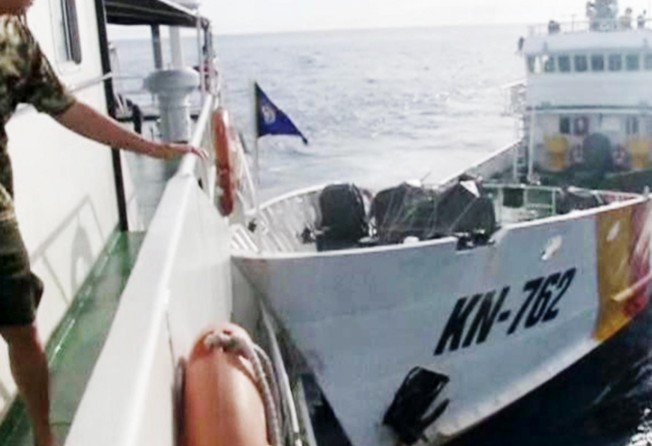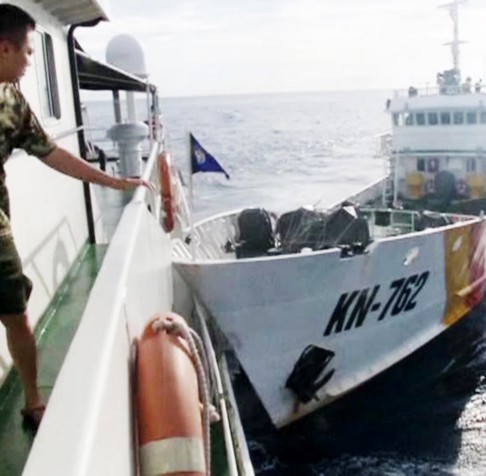
Deadly anti-China riots in Vietnam play into the hands of Beijing's hawks
Beijing has taken a softer stance with Hanoi over territorial claims, but that may be about to change


The rioting, triggered by China's towing of an oil rig into disputed waters near the Paracel Islands - which China calls the Xisha Islands and Vietnam knows as the Hoang Sa Islands - earlier this month also exposed Vietnam's limited options. The deaths of Chinese civilians will create an opening for Beijing to harden its stance, and it will test the United States' resolve as the region remains at loggerheads with China over maritime territorial disputes.
Since tensions over the South China Sea began rising in 2011, Vietnam has been one of the most vocal claimant states, along with the Philippines, in confronting China's claims. In contrast to its harsh approach towards Manila, Chinese scholars said Beijing had been "softer" towards Hanoi given their shared ideological history and closer economic ties. But this might change now, as the fatal riots in Vietnam could sway the momentum to the hawkish side and create an opportunity for Beijing to take a tougher stance.
Even before the incident, many within the government and academic circles had been debating a harsher approach to Vietnam, said Du Jifeng , a research fellow at the Institute of Asia Pacific Studies of the Chinese Academy of Social Sciences.
"In the past, China had hoped that through offering economic benefits, the other claimants would maybe compromise on the territorial issue, or at least not incite provocation," Du said. "But in reality this method may not always work. [When it doesn't work] a lesson should be taught."
China maintains it will continue operating the rig in the disputed waters despite protests and condemnation from Vietnam and the US.
General Fang Fenghui , chief of the general staff of the People's Liberation Army's, repeated that message after talks at the Pentagon in Washington on Thursday. "What we're going to do is ensure the safety of the oil rig and ensure the operation will go on," he said.
Xu Liping , an expert on Southeast Asia with the Chinese Academy of Social Sciences, said China was no longer willing to compromise its territorial integrity in return for improving relations with neighbouring countries, as "history has proved that compromise would not deliver peace and stability".
The stated-owned China National Offshore Oil Corporation deployed oil rig Haiyang Shiyou 981 on May 1 to Block 143, an area in the Paracels administered by China but also claimed by Vietnam. Hanoi said the deployment was illegal as the location was within the country's exclusive economic zone. But the Chinese foreign ministry said the rig was operating within the waters of China's Xisha Islands, and accused Vietnam of trying to "harass" the Chinese operation.

Anti-China protests in Vietnam began on Tuesday and turned violent, with mobs burning and looting foreign-owned factories. There were at least two confirmed deaths. More protests are expected this weekend.
While Chinese scholars said Beijing was taken by surprise by the magnitude and scale of the protests, others in the region said Vietnam was also taken aback by the unexpected deployment of the rig off its coast.
Official mouthpiece Xinhua noted that China had been preparing for the drilling for some time and it was something that Hanoi was fully aware of.
It also came just months after Premier Li Keqiang's October visit to Hanoi, during which he tried to reach an understanding with Vietnam's top leaders on how to improve ties.
"It did come as a surprise. The scale is quite big and it looks like it's going to spread," said Du. "And this incident shows that confrontation between China and Vietnam is as bad as that between China and the Philippines. This is also quite surprising."
The incident also came as a surprise for Hanoi, as bilateral relations had been on an upswing over the past two years, said Ian Storey, a senior fellow with Singapore's Institute of Southeast Asian Studies.
In 2011, Beijing and Vietnam had sparred in the South China Sea after Hanoi accused some Chinese ships of deliberately cutting the cables of Vietnamese vessels. But ties had been gradually on the mend - until the riots.
"It sent back the relationship [between China and Vietnam] several decades. And now we have at least three months of this ahead of us," Storey said, describing the tension as the worst since 1979, when the two countries fought a brief border war.
"I don't think what happened over the past week is going to make either the Chinese more flexible and accommodating or the Southeast Asian countries more willing to compromise their claims," he said.
The Chinese Maritime Safety Administration has said that the oil rig will stay in the area until August.
Carl Thayer, from the Australian Defence Force Academy, said Hanoi had few cards it could play. "The Vietnamese have no options. If they react impetuously they will suffer even worse. So they have got to keep appealing to the world community and carefully calculate what step would be provocative," said Thayer.
While the incident could potentially nudge Vietnam closer to the United States, Thayer said many in Hanoi still had reservations about a full-frontal confrontation with China and had doubts about what Washington could offer.
"If you have to make that decision, be aware of the cost from China," Thayer said.
It sent back the relationship [between China and Vietnam] several decades
Many observers have linked the rig's deployment to US President Barack Obama's renewed efforts to reassure countries in the region of America's commitment in Asia. On his recent high-profile tour of East Asia, Obama visited Japan and Philippines but did not go to Vietnam. Still, the two countries have increased military cooperation in recent years as part of the US' rebalancing towards the Asia-Pacific.
China's message, Storey in Singapore said, could be: "Okay, here is Obama talking about the 'pivot', but what does this really mean?
"And in this case there is really nothing the US can do other than referring to it as a provocation."
In his meeting with Fang, US Vice-President Joe Biden voiced "serious concern" over China's actions and said no nation should take provocative steps to advance its claims to disputed areas in a way that undermined peace and stability in the region.
